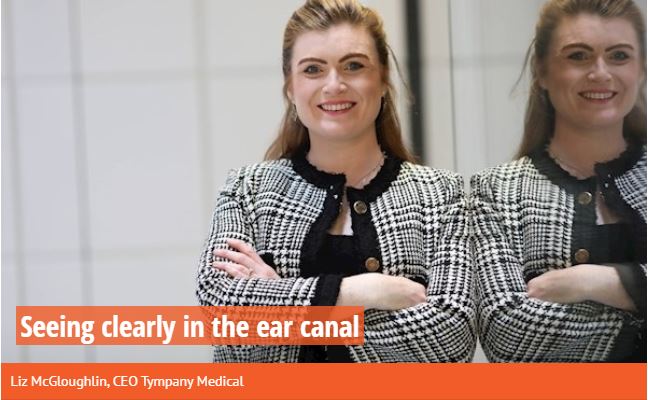15/10/2019

Tympany Medical is using technology to help in ear surgical procedures
Galway start-up Tympany medical has plans to revolutionise the way surgery for hearing loss is performed. The endoscope called the OtoVU, uses cutting edge optic and sensor technology to visualise the ear canal more comprehensively than was previously possible. Medical doctor Liz McGloughlin, co- founder and chief executive of the year- old company. says there are now 20 mil- lion patients globally requiring come plex surgical interventions for hearing loss who would benefit from the use of this device. With a three-year plan to launch its first product in 2022. The team has also begun research and development to adapt the endoscope for use in a whole range of applications. "It could be used to improve visibility and access in all types of endoscopic surgery." she said, adding that 40 million of surgical endoscope procedures are performed worldwide every year. A spin-out company from NUI Galway, Tympany Medical is currently in the process of raising €2m in seed investment which will allow it to complete its product development and to secure regulatory approval in the US, which is where it plans to launch. In setting up the company in 2018, Ms McGloughlin was joined by medical device designer Rory O'Callaghan.
Participating in the Biolnnovate programme at NUIG in 2016 they identified a need for technology to replace the scope which has been used in ear surgery for over 50 years. "At present large cumbersome microscopes are being used which doesn't give flexibility in the field of view." said Ms McGIoughlin. She explains current options for complex ear operations involve drilling a hole in the patient's head or else retraining surgeons to perform the surgery with one hand, which is incredibly difficult to do. At NUIG in late 2017, the founders began work on developing technology which would reduce the need for invasive ear surgery while maintaining surgical technique and minimising surgeon retaining
Supported by Enterprise Ireland Commercialisation Fund, they worked with Professor Ivan Keogh from University Hospital Galway and also collaborated with clinicians from the Mayo Clinic in the US. By this summer they had developed
a prototype or the endoscope, which in recent weeks has successfully tested in simulations. The company is now preparing to carry out further tests both in Ireland and the US.
Established at Translational Research Centre at University Hospital in Galway in 2018, Tympany Medical received €50,000 funding from the European Institution for Innovation and Technology Headstart Programme. This helped with product development and allowed it to take on a biomedical engineer. " Seed investment will allow us to bring on board a team to develop a platform for wider application, " said MS McGIoughIin. She adds that in January next year the company plans to hire a senior electronic engineer and a project manager and aims to have a staff of five by the end of 2020. Immediate plans following completion of seed investment involve starting work on securing regulatory approval for OtoVU and advancing the platform technology which will be embedded in pipeline products. "We will be launching into the US in the first instance as it is a large homogenous market with a high volume requirement and will then develop sales in Europe." she said adding that the company plans to assemble the endoscopes in Ireland. Although the immediate focus is on getting OtoVU to market. Tympany has already started work on developing a pipeline of products for use in other types of endoscopies.
'Ms McGloughlin says that while the endoscopes are currently being developed for use in surgery, the company is exploring the possibility of their use as diagnostic tools in outpatient centres. "Within five years our aim is to develop OtoVu as an international gold standard device for ear surgery improving outcomes, reducing the need for invasive surgery such as mastoidectomies and minimising the requirement for extensive clinician retraining," she said.
Source: The Irish Examiner